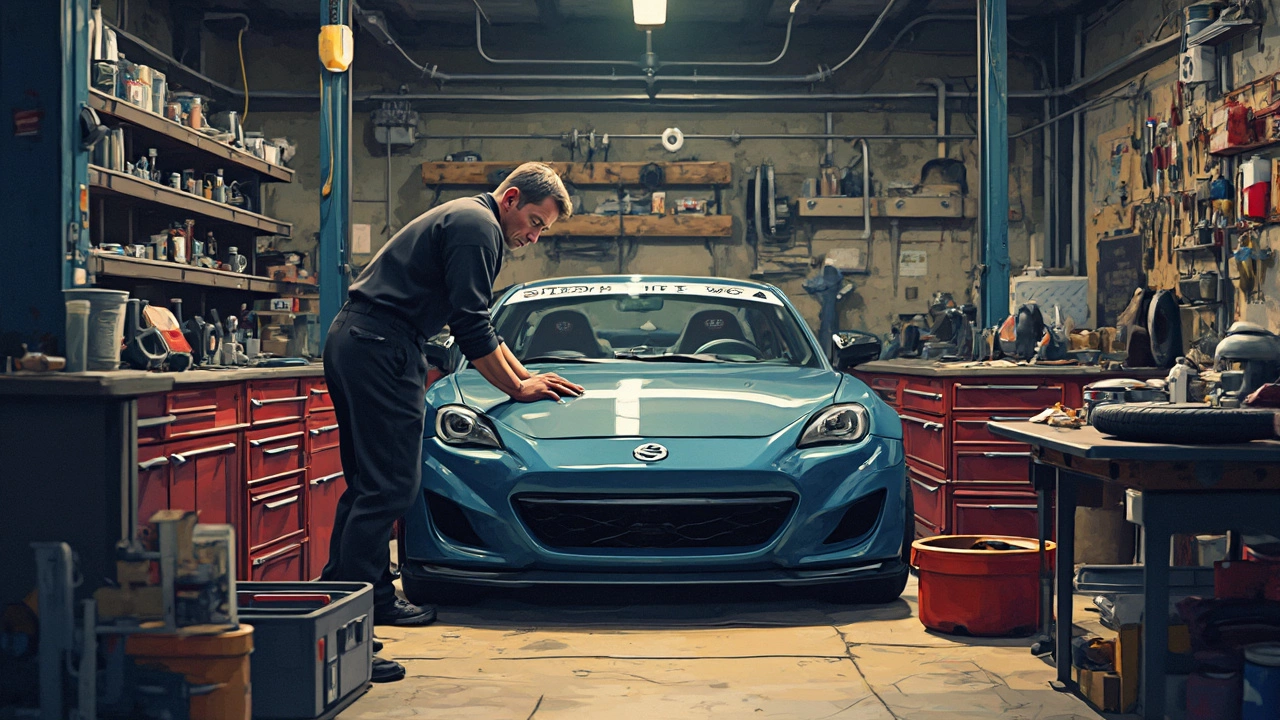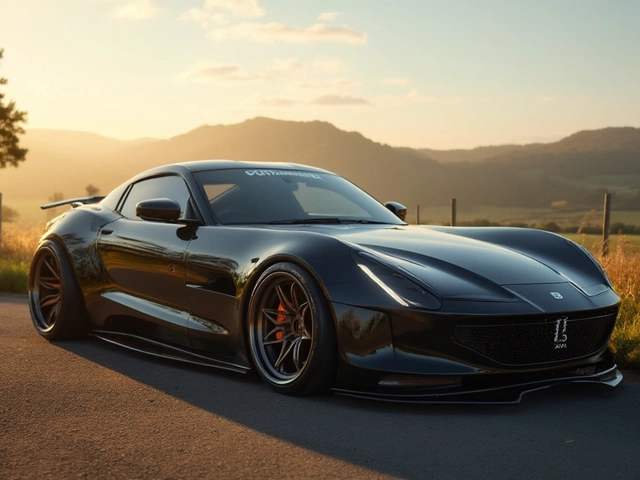So, you’re thinking about slapping a body kit on your car, huh? It’s tempting, no doubt—getting those sleek spoilers and cool side skirts. But does it actually crank up your car’s value? Well, it’s not as straightforward as you might think.
Let’s start with the obvious: body kits can transform the way your car looks—and they sure turn a lot of heads. It’s like giving your car a spicy makeover. But under that shiny new appearance, you gotta wonder, does it actually make your car worth more? Not always.
Here’s the deal, sometimes body kits can indeed boost your car’s resale value, especially if the potential buyer is a mod enthusiast. But for others, it might not make a difference or could even deter some folks from buying. It’s all about finding that sweet spot between style and substance that suits your car best.
- The Aesthetic Appeal of Body Kits
- Impact on Resale Value
- Quality and Installation Concerns
- Performance Enhancements
- Deciding If a Body Kit is Right for You
The Aesthetic Appeal of Body Kits
Let’s be real, a sweet-looking car is something most of us dream about. Slapping on a body kit can make your ride look like it just zoomed off a movie set. We're talking bumper kits, side skirts, spoilers, and all sorts of cool stuff that can give your vehicle a unique vibe.
First off, the visual transformation is undeniable. A body kit changes the lines and shapes on your car, adding an aggressive or sleek look, whatever floats your boat. Think about those souped-up cars you see at car shows or rolling through your neighborhood. They didn’t look like that straight out of the factory.
But beyond just looking good, there’s a whole culture around car modifications. Enthusiasts invest in body kits to not only stand out but also to express their personality through their car. It’s about turning something standard into something personal and exciting.
However, your choice in a body kit can impact the overall reaction. Some kits are subtle, enhancing the car’s natural design. Others are more extreme, which can be awesome but might not be everyone’s cup of tea. Picking a style that complements your car’s design while reflecting your taste is key.
One fun fact: the aerodynamic tweaks offered by certain body kits might actually improve your car's performance by reducing drag and increasing downforce when executed right. It’s not just about looks, it’s about functionality too!
Impact on Resale Value
Alright, let's get down to the nitty-gritty of how a body kit can impact your car’s resale value. You might be banking on your souped-up ride fetching more bucks, but the truth is, not everyone sees these mods as a value add.
First off, consider the taste factor. Mods such as body kits can be a love-it-or-hate-it deal. Car enthusiasts might drool over your decked-out chassis, but the average buyer might just see more to maintain or revert. Remember, what looks like art to some, might just be extra weight to others.
Quality is key here. If you slap on a low-quality kit, it might actually hurt your car’s value. Buyers could be turned off by poorly fitted parts or materials that have worn out easily. A professionally installed, high-quality kit is more likely to boost the car's appeal and resale price.
Keep in mind that certain cars benefit from body kits more than others. For instance, luxury or sports cars with body kits often attract buyers willing to pay a premium for the upgraded aesthetics. It’s all about market demand. Always research if there’s a niche demand for your particular car model before investing in those mods.
Think of it like this: If you've got a high-quality kit that enhances your unique model and holds up well over time, it might just give you an edge in the market. But if the body kit veers too far from the car’s original charm or tackles a market that doesn’t care much for it, you might not see the return you’re hoping for.
Ultimately, whether a body kit increases value is a bit of a gamble. The key takeaway? Know your audience, invest in quality, and make sure that flashy look doesn't compromise the car's core appeal.

Quality and Installation Concerns
Alright, let’s dive into the nitty-gritty. The quality of a body kit isn’t just about looking good; it’s also about durability and fitting right. Think about it like buying a new shirt. You wouldn’t want one that's gonna rip after the first wash or doesn’t fit right, would you?
Body kits come in materials like fiberglass, polyurethane, and carbon fiber. Each has its own pros and cons. Fiberglass is cheaper and takes paint well but can be prone to cracking. Polyurethane is tougher and scuffs less easily but can be a bit pricier. Meanwhile, carbon fiber is strong and lightweight, often favored by high-performance car enthusiasts, but it's usually the most expensive of the lot.
As for installation, don’t underestimate it. A poorly fitted kit can cause all kinds of issues, like rattles, and might even decrease your car’s value instead of boosting it. Therefore, getting it done by a pro is often worth the extra cash. They’ll ensure everything lines up perfectly and holds strong, maintaining both the performance and aesthetics of your ride.
Here’s a quick checklist for you:
- Pick materials wisely based on your budget and needs.
- Make sure the kit is specifically designed for your car model. One-size-fits-all doesn’t apply here.
- Leave the fitting to experienced hands if possible. Messing it up yourself could cost more in the long run.
If you decide that a body kit is the way forward, invest the time and money to do it the right way. You'll thank yourself later when your car not only looks slick but stays on the road trouble-free.
Performance Enhancements
While most folks slap a body kit on their ride for the killer looks, some savvy car lovers know there’s more to it. That’s right; a body kit can offer some serious performance perks too.
One of the main performance boosts comes down to improved aerodynamics. Many body kits help decrease drag by channeling airflow around your car more efficiently. Less drag means your car can cut through the air with more ease, potentially boosting your speed and fuel efficiency. Win-win, right?
Another benefit is the downforce created by certain spoilers and diffusers. More downforce means better grip on the road, which can seriously help when you’re zipping around corners or taking high-speed turns. It’s like giving your car a bit more stickiness to the tarmac.
But hold your horses. Not all body kits do the same magic. Some are purely cosmetic and won't give you an edge in performance. It’s super important to do your homework and check that the body kit you’re eyeing actually comes with these performance goodies.
- Research brands known for their performance-enhancing kits, like APR or Veilside.
- Check if the kit has been tested in real-world conditions or just looks good on paper.
- Be sure it fits your car model perfectly—no one wants a kit that doesn’t play well with your vehicle’s natural curves.
A word of caution, though: adding a body kit that doesn’t quite fit or isn’t properly installed can mess with your car’s original performance. So, always get a pro to do the install, or at least someone who knows their stuff. Because at the end of the day, combining style with performance is the dream for a true car enthusiast.

Deciding If a Body Kit is Right for You
Before you take the plunge and put a body kit on your ride, think about what you want out of it. Is it just the look you’re after, or are you hoping for a boost in performance or car value? Knowing your end goal is key.
First off, think about how you use your car. If you’re a casual driver who just commutes, an aggressive race-ready kit might not be your jam. But, if you hit the track on weekends, the added aerodynamics from a well-designed kit could make a big difference.
Next, consider your budget. A high-quality car modification isn’t cheap, and installation can add up too—it's something you don't want to skimp on, as poor fitting kits can lower your car’s worth.
- High-end kits are more precise and durable, while budget options might not fit well or last long.
- Resale value might increase if you choose a reputable kit brand, but going for a cheaply-made option could backfire.
Also, take into account the kind of cars typically equipped with mods like these. Sports cars and certain sedans often look right at home with them, while some vehicles might not see the same appeal. It’s worth checking forums or groups specific to your car model to see how common and accepted such mods are among enthusiasts.
Durability and material are other considerations. Cheap fiberglass kits are more prone to damage, whereas polyurethane options offer better flexibility and durability. So, even though a top-grade kit might cost more upfront, it could save you headaches in the long run.
If you’re unsure about the resale impact, you might want to consult with car appraisal experts or dealers. Keep in mind a stark transformation might not align with everyone’s taste, potentially shrinking your buyer pool.
Deciding to mod is a big step, so weigh these factors and be clear on why you want a body kit. Make sure it suits your lifestyle and budget—doing homework now could save you time and cash later.




